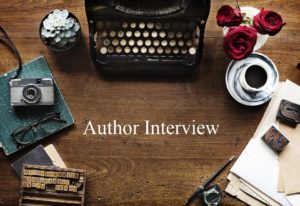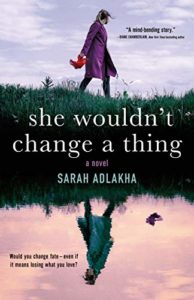An Interview with Sarah Adlakha
 2021 Debuts author Sarah Adlakha has a lot to smile about these days. Her debut novel, She Wouldn’t Change a Thing, released last week, and already, it’s doing very well. Prior to publication, it landed on CNN’s “The Best New Books of August 2021,” which included some big names like Stephen King and Sandra Brown, and Alene Moroni wrote of the book in Booklist, “The characters are relatable, the story is gripping, and the blend of domestic fiction with a hint of science fiction is just plain great. Offer it to fans of Kate Atkinson’s Life after Life (2013), Jo Walton’s My Real Children (2014), and book clubs.” Having read the book (and loved it), I agree with Moroni’s assessment. Sarah is still in the thick of launching the book, and she leads a very busy life, so I’m especially thankful that she had time to answer a few questions.
2021 Debuts author Sarah Adlakha has a lot to smile about these days. Her debut novel, She Wouldn’t Change a Thing, released last week, and already, it’s doing very well. Prior to publication, it landed on CNN’s “The Best New Books of August 2021,” which included some big names like Stephen King and Sandra Brown, and Alene Moroni wrote of the book in Booklist, “The characters are relatable, the story is gripping, and the blend of domestic fiction with a hint of science fiction is just plain great. Offer it to fans of Kate Atkinson’s Life after Life (2013), Jo Walton’s My Real Children (2014), and book clubs.” Having read the book (and loved it), I agree with Moroni’s assessment. Sarah is still in the thick of launching the book, and she leads a very busy life, so I’m especially thankful that she had time to answer a few questions.
Christina: The bio on your website states that “writing is her second career but her first dream job.” Your first career is as a psychiatrist. Did medicine and writing always vie for the top spot? What made you choose medicine over writing years ago?
Sarah: That’s a great question. Writing definitely didn’t get a fair shake. I don’t know if all Gen Xers grew up this way, but I never considered choosing a career based on passion or lifestyle. I have always been a writer, but from the moment I entered college, my career goals were focused on financial stability and independence. I was a double major in college, English and Biology, and while I was more passionate about literature and writing, I knew that my future would take me to the sciences. It wasn’t until I sold my first book recently that I even considered making a career out of writing. I don’t regret my choices. Being a psychiatrist gave me the chance to study people and develop the ability to craft more complex characters, but I can see the value now in finding a career that complements your personality and makes work seem a little less like work.
Christina: I love good time travel stories, and in my opinion, She Wouldn’t Change a Thing is one of them. Where did the idea for this story come from? And was time travel a part of the premise right from the beginning?
Sarah: The idea for the novel came from some of my interactions with previous patients. I remember one patient in particular asking me if I believed the story he was telling me (he was clearly psychotic) and I couldn’t answer him. Obviously, I didn’t believe him, but at that moment I remember thinking, what if he’s telling the truth? He clearly believed what he was saying was factual, and I didn’t want to lie to him, so I said, “I don’t know if what you’re telling me is true or not. I’ve never experienced what you’re going through. But, either way, if the medicine I give you can make it go away, wouldn’t it be worth it?” And then I started wondering what I would do if I found myself in the same situation. What if I, as a psychiatrist, came back from the future and had to convince everyone around me that I wasn’t psychotic? Could I do it? And that is essentially the situation Maria, the main character in my novel, finds herself in.
Christina: The book features a heartbreaking choice for the main character, Maria. As a fellow mother, I stopped at that point in the book and allowed her choice to ferment in my brain. Without giving anything away about the book, did you struggle with giving Maria that choice? Did you have a hard time deciding which option she’d choose?
Sarah: I always knew what choice Maria would make. That said, I don’t know what choice I would make if I was in her situation. There really are no good options. It’s been interesting to scan over some of the early reviews from readers who are in opposite camps. Some think, with absolute certainly, that Maria made the right choice, while others, with that same certainty, insist that she made the wrong one. I think the vast majority of readers, though, fall somewhere in the middle, like me. I love discussing it with family and friends once they’ve read the book. I hope it will make for some impassioned discussions at book clubs.
Christina: You’re working on a sequel that features George, a nonagenarian who played a minor but important role in your debut. How did you decide to focus on George. What have you learned from him?
Sarah: George has certainly been a crowd favorite from the beginning. I think what makes him so intriguing is the gravity of the choice he was sent back to make. Like Maria, he is a repeater, and someone who offers her some advice and grace as she’s going through this horrific event. Unlike Maria, though, his choice has much wider implications, namely changing the course of World War I. I am an historical fiction enthusiast, so it was only natural for me to follow George’s journey through time. I’m bringing the same elements of time travel into the second book, but there is a great deal of historical significance to the story, as well.
Christina: Working, writing, and parenting all demand a lot from a person, and you also homeschool your daughters. How do you find the time to get what you need, not just in terms of writing time, but in terms of me-time overall? Do you have any tips for juggling multiple responsibilities?
Sarah: Honestly, I’m not great at it. Or even good at it. Writing, unfortunately, takes a back seat to quite a few things in my life. My children and husband come first, of course, and I run my husband’s medical practice from home, so that is also a priority over writing since it’s our main source of financial income, and now with marketing and planning the launch of book one, I’m finding it difficult to carve out time to write. Typically, I write after my six-year-old goes to bed at around 7:30 or 8pm. I don’t usually get to sleep until after midnight, but then I get up at six in the morning with my youngest, so I’m almost always sleep deprived. When I’m on a deadline, my husband will take the kids out for the weekends he’s not on call so I can get my work done, but I’m hoping when the school years starts up, I can get into a better routine. We’re doing a combination of homeschooling and public schooling this year, so I’m determined to find some time for myself at some point this fall.
Christina: With three daughters at home, life is never dull (I grew up with two sisters). Do any of the lessons you learn from your children inform your writing? What do you hope your children learn from you?
Sarah: My daughters are my greatest teachers. I’m always impressed with women (or men) who can illicit an emotional response when writing about mother/daughter relationships without ever having been a mother. I don’t think I could have pulled it off. Even though two of my daughters are twins, all three of them are so vastly different from each other, it’s almost a wonder that they were all raised in the same home by the same parents. But I love that about them. Their individuality. I have learned lessons from each of them—just from watching them—that I never could have imagined possible: patience, acceptance, tolerance, discipline, joy. I have faltered immensely as a mother, but somehow these beautiful people are finding their way through childhood and adolescence, and I can’t wait to meet the adults who come out on the other side. I hope that comes through in my writing, that the dynamics of relationships are not static, and that they’re meant to evolve over time. I suppose that would be the lesson I would want my children to learn from me, as well. There is no perfect relationship, and the bonds between people—whether spouses or children or siblings or whatever—are often messy, but that doesn’t mean they aren’t beautiful. My relationship with my husband looks far different today than it did when we got married almost twenty years ago, but it is absolutely one of the most beautiful relationships I’ve ever known.
Christina: What is your writing kryptonite?
Sarah: The internet. I have the attention span of a gnat, so I can get lost for hours online. I developed a routine that works fairly well for me, even though I typically have zero willpower. I set the timer on my phone for forty-five minutes and then place it on the other side of the room so I can’t see any Facebook or Instagram notifications or emails. During that time, I’m not allowed access to anything on my computer except the document I’m working on. When the timer goes off, I set it again for ten minutes and allow myself free reign. Then I repeat the whole process until I’m done for the day. The key is making sure to set the ten-minute timer for the break, because you’ll swear you’ve only been online for thirty seconds when it goes off. I developed this for my kindergartner over the summer last year, but it seems to work equally well for both of us.
Sarah can be found in multiple places!
Website: https://www.sarahadlakha.com/
Facebook: @adlakhabooks
Instagram: @sarahadlakha
Twitter: @SarahAdlakha
Thanks to Sarah for agreeing to this interview! If you know of an author who’d like to be featured in an interview (or you are an author who would like to be featured), feel free to leave a comment or email me via my contact page.

